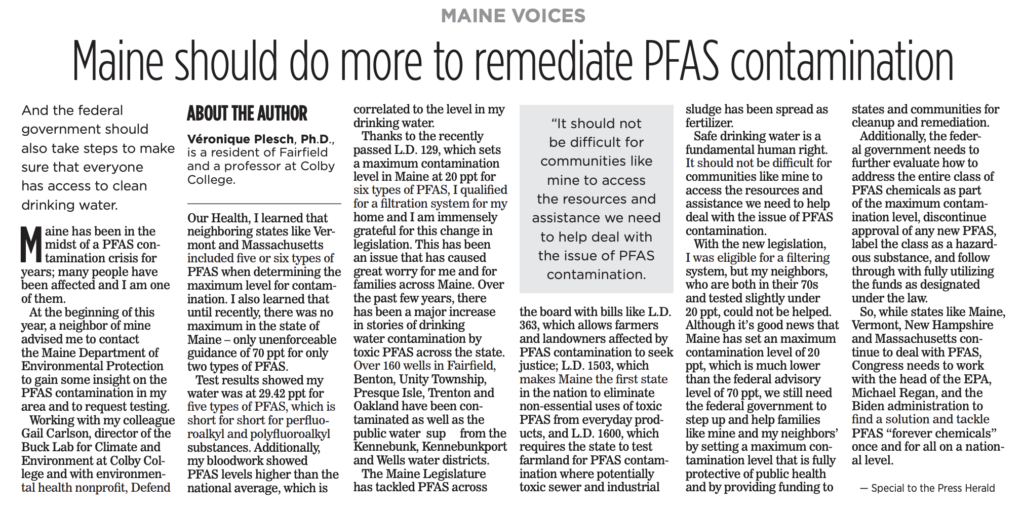Colby College Professor Calls For Federal Action on PFAS
October 14, 2021 | Legislative Campaigns, Safe Water | Tags: Biden, Contamination, Federal Government, Legislation, Maine, Michael Regan, pfas
This week, Dr. Véronique Plesch, a professor at Colby College and resident of Fairfield, Maine, shared her experience with PFAS contamination in the Portland Press Herald.
Dr. Plesch is one of many Maine residents who have been affected by Maine’s “PFAS contamination crisis,” as she called it. After requesting a testing kit, Plesch discovered that the amount of PFAS in her drinking water exceeded the maximum state limit of 20 parts per trillion (ppt). Previously, there had been no legal maximum limit in Maine, only an “unenforceable guidance” of 70 ppt for just two types of PFAS. But thanks to LD 129 —a new bill that Defend Our Health proudly helped to pass in the Maine legislature this year — she was able to qualify for a water filtration system.

Plesch states that she is “immensely grateful” for recent changes in Maine legislation that aim to tackle PFAS, including the passage of other bills that Defend Our Health has advocated for, like LD 1503 and LD 1600. And like Defend Our Health, Plesch believes that: “Safe drinking water is a fundamental human right.”
“I was eligible for a filtering system, but my neighbors who are both in their 70s and tested slightly under 20 ppt, could not be helped,” writes Plesch. This, among many other reasons, is why she believes the federal government needs to: set a maximum contamination level of PFAS that is “fully protective to public health” and “provide funding to states and communities for cleanup and remediation.”
Additionally, Plesch calls on the federal government to look into addressing the entire class of PFAS as part of the maximum contamination level. Although it is a major step in the right direction, LD 129 considers only 6 types of PFAS. In total, there are around 4,700 types of PFAS worldwide — a great reason for the federal government to also “discontinue approval of any new PFAS” and label the entire class as hazardous substances.
We’ve seen some progress, but it is time for the EPA to act.
Her piece concludes by calling on Congress to work with the Biden Administration and Michael Regan, the head of the EPA, to tackle PFAS. We are delighted to see educators like Dr. Plesch calling on the federal government to take action on the PFAS crisis. PFAS is not only a Maine issue — it is a national issue and it’s time for the federal government to act. Read the article here to learn more.
